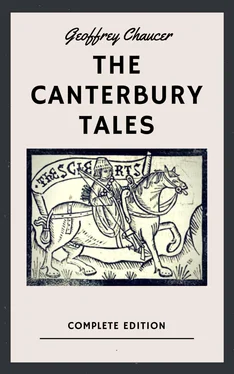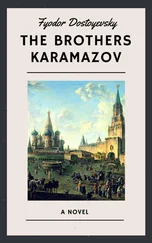Now was this child as like unto Constance
As possible is a creature to be:
This Alla had the face in remembrance
Of Dame Constance, and thereon mused he,
If that the childe's mother *were aught she* *could be she*
That was his wife; and privily he sight,* *sighed
And sped him from the table *that he might.* *as fast as he could*
"Parfay,"* thought he, "phantom** is in mine head. *by my faith
I ought to deem, of skilful judgement, **a fantasy
That in the salte sea my wife is dead."
And afterward he made his argument,
"What wot I, if that Christ have hither sent
My wife by sea, as well as he her sent
To my country, from thennes that she went?"
And, after noon, home with the senator.
Went Alla, for to see this wondrous chance.
This senator did Alla great honor,
And hastily he sent after Constance:
But truste well, her liste not to dance.
When that she wiste wherefore was that sond,* *summons
Unneth* upon her feet she mighte stand. *with difficulty
When Alla saw his wife, fair he her gret,* *greeted
And wept, that it was ruthe for to see,
For at the firste look he on her set
He knew well verily that it was she:
And she, for sorrow, as dumb stood as a tree:
So was her hearte shut in her distress,
When she remember'd his unkindeness.
Twice she swooned in his owen sight,
He wept and him excused piteously:
"Now God," quoth he, "and all his hallows bright* *saints
So wisly* on my soule have mercy, *surely
That of your harm as guilteless am I,
As is Maurice my son, so like your face,
Else may the fiend me fetch out of this place."
Long was the sobbing and the bitter pain,
Ere that their woeful heartes mighte cease;
Great was the pity for to hear them plain,* *lament
Through whiche plaintes gan their woe increase.
I pray you all my labour to release,
I may not tell all their woe till to-morrow,
I am so weary for to speak of sorrow.
But finally, when that the *sooth is wist,* *truth is known*
That Alla guiltless was of all her woe,
I trow an hundred times have they kiss'd,
And such a bliss is there betwixt them two,
That, save the joy that lasteth evermo',
There is none like, that any creature
Hath seen, or shall see, while the world may dure.
Then prayed she her husband meekely
In the relief of her long piteous pine,* *sorrow
That he would pray her father specially,
That of his majesty he would incline
To vouchesafe some day with him to dine:
She pray'd him eke, that he should by no way
Unto her father no word of her say.
Some men would say,<17> how that the child Maurice
Did this message unto the emperor:
But, as I guess, Alla was not so nice,* *foolish
To him that is so sovereign of honor
As he that is of Christian folk the flow'r,
Send any child, but better 'tis to deem
He went himself; and so it may well seem.
This emperor hath granted gentilly
To come to dinner, as he him besought:
And well rede* I, he looked busily *guess, know
Upon this child, and on his daughter thought.
Alla went to his inn, and as him ought
Arrayed* for this feast in every wise, *prepared
*As farforth as his cunning* may suffice. *as far as his skill*
The morrow came, and Alla gan him dress,* *make ready
And eke his wife, the emperor to meet:
And forth they rode in joy and in gladness,
And when she saw her father in the street,
She lighted down and fell before his feet.
"Father," quoth she, "your younge child Constance
Is now full clean out of your remembrance.
"I am your daughter, your Constance," quoth she,
"That whilom ye have sent into Syrie;
It am I, father, that in the salt sea
Was put alone, and damned* for to die. *condemned
Now, goode father, I you mercy cry,
Send me no more into none heatheness,
But thank my lord here of his kindeness."
Who can the piteous joye tellen all,
Betwixt them three, since they be thus y-met?
But of my tale make an end I shall,
The day goes fast, I will no longer let.* *hinder
These gladde folk to dinner be y-set;
In joy and bliss at meat I let them dwell,
A thousand fold well more than I can tell.
This child Maurice was since then emperor
Made by the Pope, and lived Christianly,
To Christe's Churche did he great honor:
But I let all his story passe by,
Of Constance is my tale especially,
In the olde Roman gestes* men may find *histories<19>
Maurice's life, I bear it not in mind.
This King Alla, when he his time sey,* *saw
With his Constance, his holy wife so sweet,
To England are they come the righte way,
Where they did live in joy and in quiet.
But little while it lasted, I you hete,* *promise
Joy of this world for time will not abide,
From day to night it changeth as the tide.
Who liv'd ever in such delight one day,
That him not moved either conscience,
Or ire, or talent, or *some kind affray,* *some kind of disturbance*
Envy, or pride, or passion, or offence?
I say but for this ende this sentence,* *judgment, opinion*
That little while in joy or in pleasance
Lasted the bliss of Alla with Constance.
For death, that takes of high and low his rent,
When passed was a year, even as I guess,
Out of this world this King Alla he hent,* *snatched
For whom Constance had full great heaviness.
Now let us pray that God his soule bless:
And Dame Constance, finally to say,
Toward the town of Rome went her way.
To Rome is come this holy creature,
And findeth there her friendes whole and sound:
Now is she scaped all her aventure:
And when that she her father hath y-found,
Down on her knees falleth she to ground,
Weeping for tenderness in hearte blithe
She herieth* God an hundred thousand sithe.** *praises **times
In virtue and in holy almes-deed
They liven all, and ne'er asunder wend;
Till death departeth them, this life they lead:
And fare now well, my tale is at an end
Now Jesus Christ, that of his might may send
Joy after woe, govern us in his grace
And keep us alle that be in this place.
Notes to the Man of Law's Tale
1. This tale is believed by Tyrwhitt to have been taken, with no material change, from the "Confessio Amantis" of John Gower, who was contemporary with Chaucer, though somewhat his senior. In the prologue, the references to the stories of Canace, and of Apollonius Tyrius, seem to be an attack on Gower, who had given these tales in his book; whence Tyrwhitt concludes that the friendship between the two poets suffered some interruption in the latter part of their lives. Gower was not the inventor of the story, which he found in old French romances, and it is not improbable that Chaucer may have gone to the same source as Gower, though the latter undoubtedly led the way. (Transcriber's note: later commentators have identified the introduction describing the sorrows of poverty, along with the other moralising interludes in the tale, as translated from "De Contemptu Mundi" ("On the contempt of the world") by Pope Innocent.)
2. Transcriber' note: This refers to the game of hazard, a dice game like craps, in which two ("ambes ace") won, and eleven ("six-cinque") lost.
3. Purpose: discourse, tale: French "propos".
4. "Peace" rhymed with "lese" and "chese", the old forms of "lose" and "choose".
5. According to Middle Age writers there were two motions of the first heaven; one everything always from east to west above the stars; the other moving the stars against the first motion, from west to east, on two other poles.
Читать дальше












